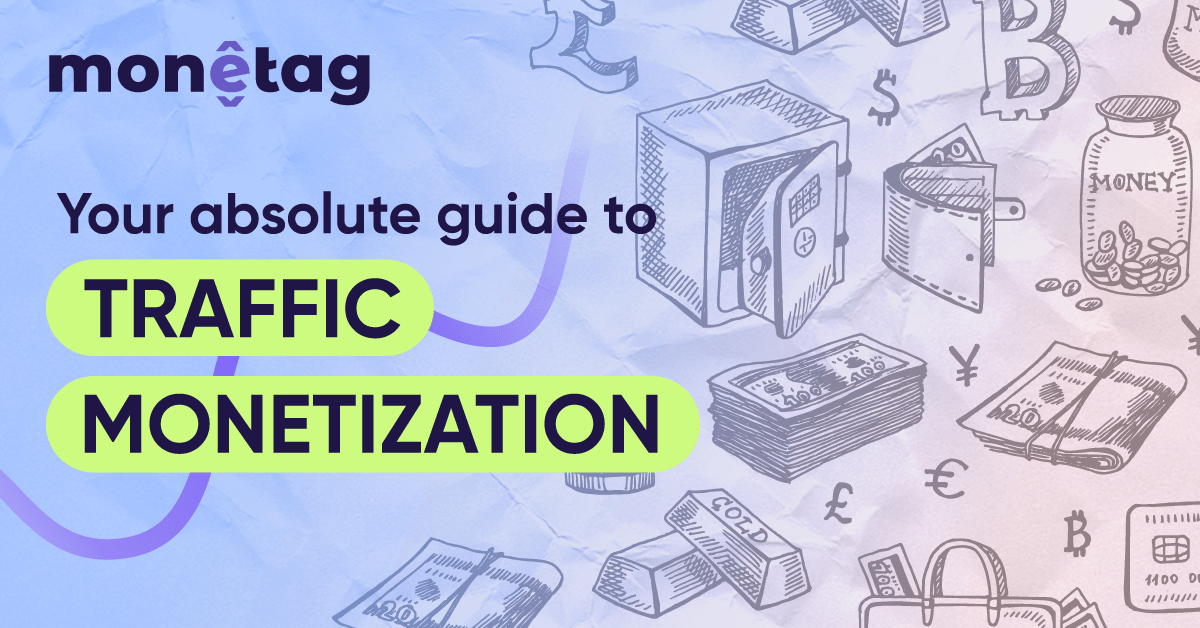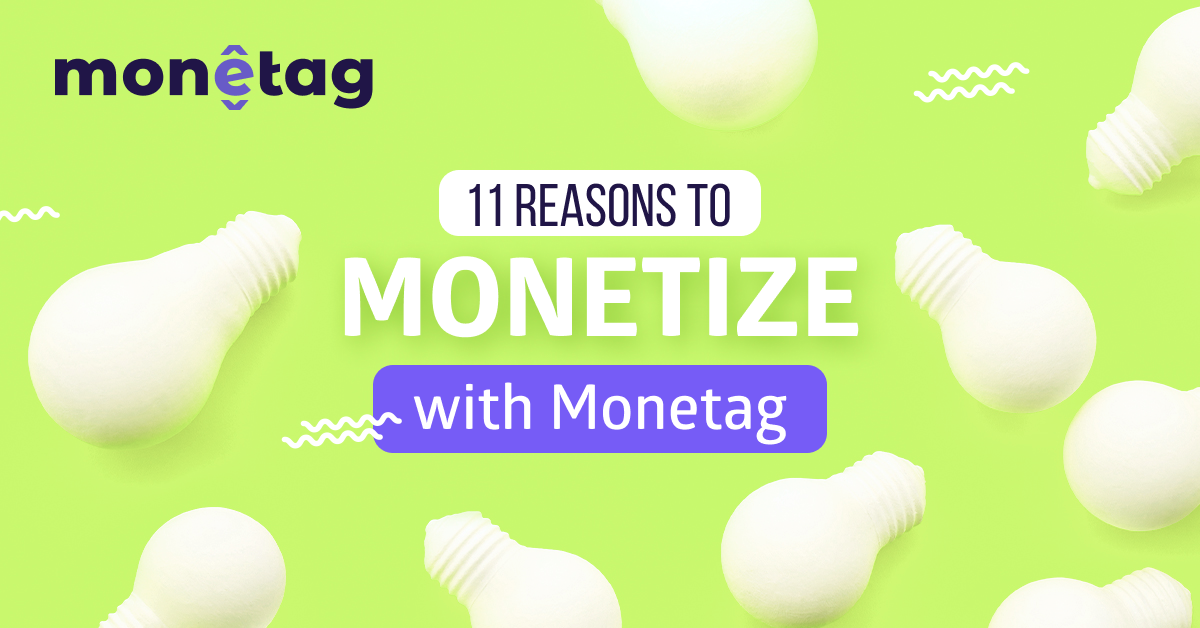How to Buy a Website and Understand How Much It Is Worth
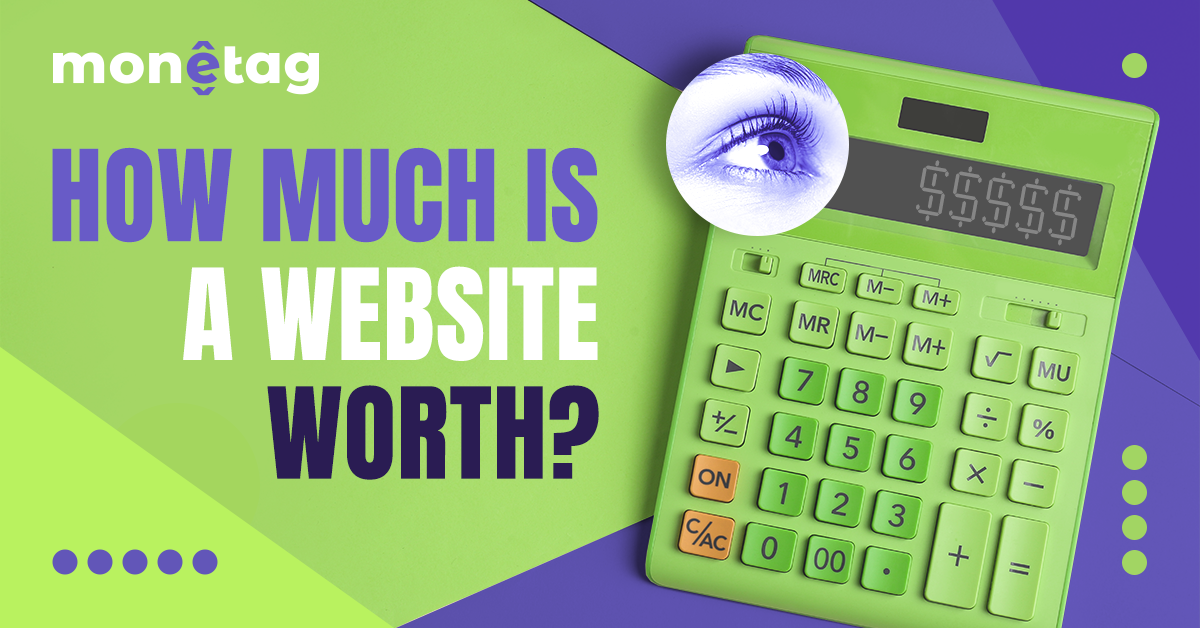
This post is also available in:
You came across this page because you want to purchase a ready website, right? If so, you definitely want to know how much you might be charged for it.
This guide will help you to estimate a website price and find a bargain — if you sell, buy, or just want to answer the question, ‘How much is my website worth?’.
Why Do People Sell Their Websites?
Usually, publishers have a good reason for selling their sites — and it doesn’t mean these sites are not profitable! We asked several publishers to share their stories and tell us about the reasons why they don’t want to run their pretty successful sites anymore.
- The website has reached its maximum potential. What does it mean? Basically, it’s when a publisher reaches stable traffic and income, but a further boost may require too much time and energy. Look what one of our publishers shared with us as an example:
“My site paid for itself in the first five months! After that, it was all net income. Then traffic and revenue went down about 20% … but I didn’t care much, as I already profited from it. Then, traffic, and my revenue growth became higher than the traffic increase. In the end, the site was making $1100-1200 per month, and I decided that it needed someone to take better care of this really great asset I did not have time to work on it. So I put it up for sale, sold it in a couple of hours, and I had ~$27K in my bank account,” says Vihaan, a publisher running financial sites
- The site owner doesn’t enjoy it anymore. Yes, it can also be a good reason! If a website has become a very unpleasant routine and a publisher doesn’t want to hire anyone to help, they might give it the last chance to bring them pleasure — e.g., sell it.
- A publisher wants to start another website and needs investment. What if a website is doing just perfectly, but the owner has an idea of a much better one? This is a very good reason to use the old website as the starting capital for a more profitable (and maybe more enjoyable) online business.
The reason that I’m selling all my websites is to earn some capital for other projects. I’m currently running English websites, but I see that this online marketing is rapidly growing in Turkey now. I don’t want to be late to take action, and I need money to launch new platforms for Turkish speakers.
- A publisher has other, more profitable projects. Sometimes, a website might take too much time or money, or both. However, a site owner knows that if they invest the same amount of time and money into another web platform, their final ROI will be much bigger. So, when someone sells a website, it doesn’t always mean they want to get rid of something useless!
What Impacts A Website Price?
So, a publisher is ready to sell their website. How do they know how much is their website worth?
First, there is a standard basic rule: your website is worth approximately 2-3 times its annual net profit. So, if a publisher earns, say, $30,000 per year, they might sell their website for $60,000 – $90,000.
However, this is a pretty big gap! How can people estimate the worth of a website more accurately? Before giving some instructions on that, let’s see what metrics affect a site’s value.
- Domain Price
A domain (the name of the website and its URL) can make a difference. There are two main metrics here: the domain age — the older a domain is, the more it is expensive, and also its history. Has it ever been blacklisted in Google? Are there any negative reviews? It all matters.
A tip from Monetag: you can quickly check a website domain rating with Ahrefs.com Authority Checker
- SEO Optimization
Is a website SEO-optimized? As a potential buyer, you might want to check how many pages contain relevant keywords and are ranked by Google. Besides, the number of backlinks and their quality also matter: we mean, how many trusted websites link to the site?
- Traffic Volumes
This one is evident: how many unique visitors does a website have per day or per month? Is this audience active? What are its retention and churn rates?
- Traffic Sources
Organic traffic, e.g., users coming from Google Search, is considered the most valuable. Such users are usually more engaged and active than ones coming from other sources. Besides, if a website mainly relies on paid ads, it means it requires a specialist who knows how to generate traffic. And it’s about extra expenses in the future!
- Revenue and expenses
Of course, you will want to monetize a website you purchased. If this site has ready solutions for that, it will add value to the deal. Great if it has several monetization options: it means the site can generate income even if one of the earning methods is not available anymore. And, of course, you will need to know how much an owner spends, so the main figure here is the NET profit.
- Website Maintenance
Is the website easy to transfer to another owner? Does its maintenance require a big team of professionals? If you feel it’s way too complicated, consider asking for some instructions from the seller.
- Additional Value
A website might have something unique — for example, some convenient tool like a handy tax calculator. Or maybe there’s a very valuable traffic source for you? It might also affect the price when you come to a particular deal.
That’s pretty much it. To make sure our list is complete, we asked a professional webmaster who makes money on purchasing sites — how does he know the site is worth buying?
“I mainly make a decision by looking at how a website earns money. For example, if it uses a stable affiliate model, I’m usually more interested than if it sells private ads. Then, I look at the traffic: I prefer websites that mainly generate organic users from Google Search. Even if a website is not perfectly monetized, my team knows how to boost monetization efforts if there is stable, high-quality traffic. Finally, I check some other metrics: domain age, ratings, and SEO optimization,” – adds Akshay, the webmaster.
How to Calculate a Website Price
Now you know what affects the price. But how to estimate it after all and make sure a seller doesn’t ask too much? Of course, we can get back to the formula ‘your website is worth 2-3 times its annual net profit’.
However, there might be a mistake again. Why?
You can set a price equal to its annual profit, but your buyer might get a much higher income within the same period. For example, if you earn $100 per month via some affiliate program, the new website owner might make the same $100 within a couple of days with, say, Monetag monetization. So, this method is not really transparent and always fair.
To be more accurate, publishers have two options. Various online website price calculators are ready to do the job within a couple of seconds — however, they won’t take all the mentioned factors into account.
Another way is to make a manual calculation.
To show you both estimation methods, we took one (pretty expensive 😜) website and compared its prices suggested by online tools with our manual calculations.
Website cost calculators
Most website price calculators are very easy to use: you give them a link to a website, and they estimate various metrics to give you an approximate price. Let’s compare some of the top popular instruments.
Worth of Web
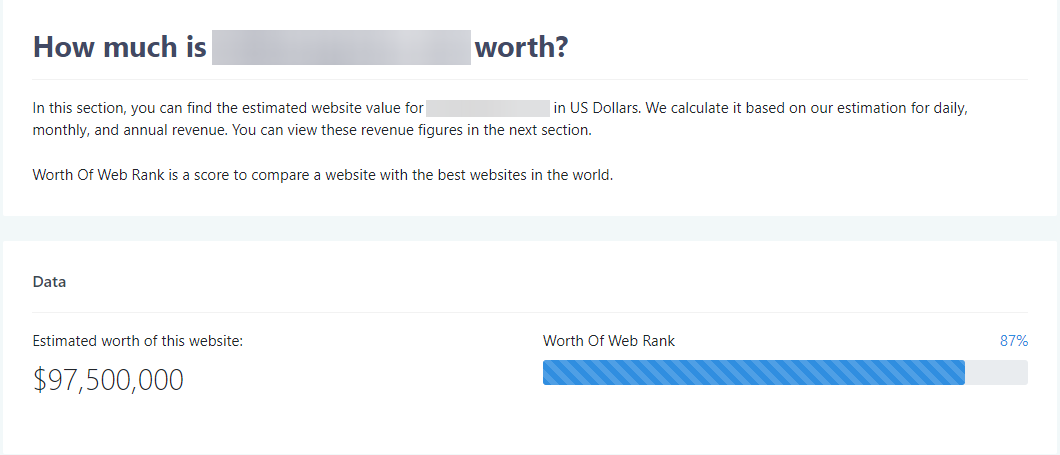
This one estimates a website domain and its ranks — and nothing else. Not bad for getting a quick idea of a website’s worth, but not really accurate. As Worth of Web says, they also ‘assume’ that a site is monetized via ads and affiliate programs, so if it’s not true, this estimation will be far from precise.
Flippa
Flippa is a marketplace for selling websites, and it has its own website worth estimator. It’s much more meticulous than Worth of Web: instead of just making some calculations based on your domain rank, it asks a publisher particular questions:
- When did you start your website?
- What are your revenue and profit?
- What is your main traffic source?
- How do you monetize your website? and more.
Finally, a website owner will receive an email like this:
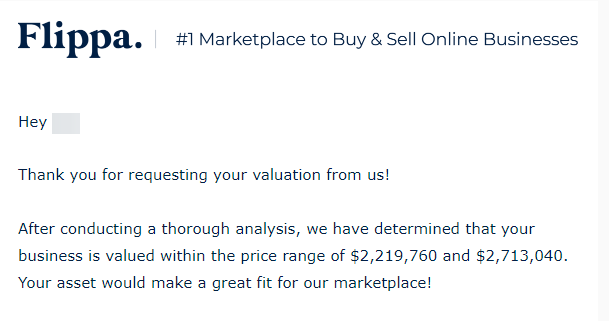
Sounds like a much more conscious approach, right? However, again, don’t rely on the results too much: the list of questions is still not enough to give the final result.
A little spoiler: after the estimation is ready, Flippa’s managers will contact a publisher personally to help with a more thorough analysis and selling process.
SitePrice.Org
This calculator will estimate website traffic pretty accurately — but it still can’t take into account the revenue, additional values, and expenses. Look what it does:
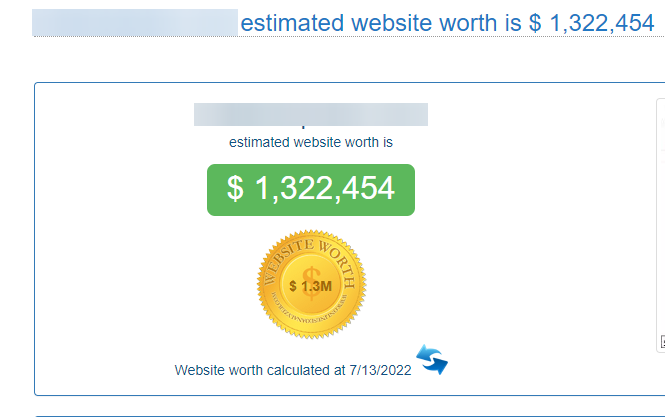
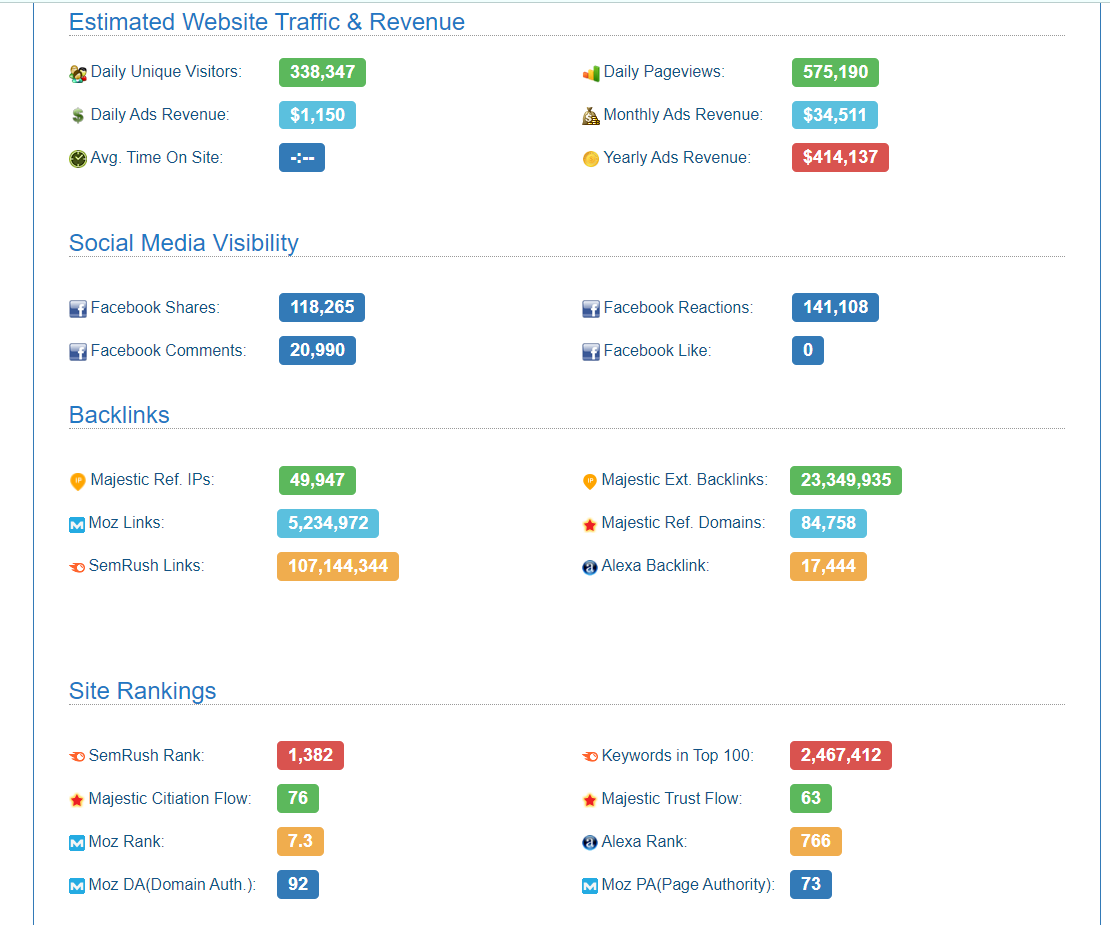
SiteWorthTraffic
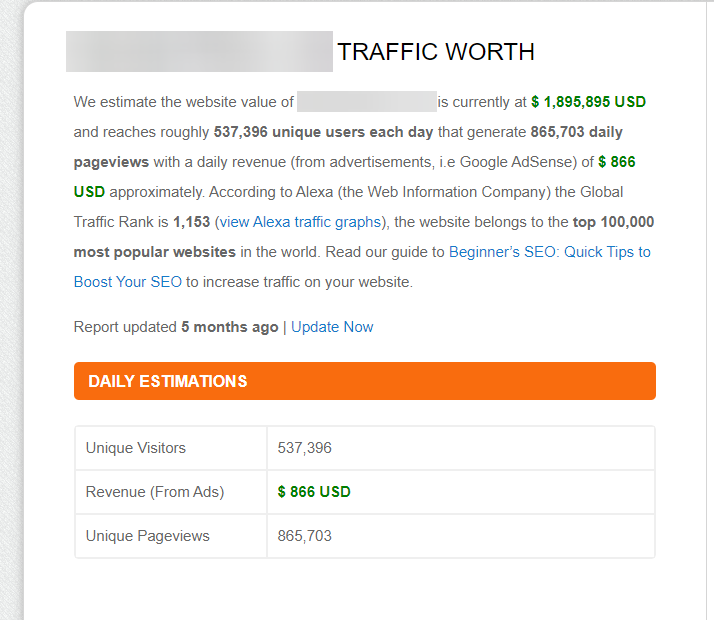
Almost the same as the previous one — but look, it shows different results for the same website. This is actually the main reason why manual website cost calculations are also important too: who knows your traffic, revenue, and extras better than the owner?
Tip from Monetag: using an online website worth estimator is basically a good idea if a site doesn’t generate income but has stable traffic. This way, you won’t bother yourself with counting revenues and expenses but will understand how much the website traffic is worth.
Manual Website Price Estimation
You saw what might be wrong with automated tools. To do better, you can try manual calculation with the help of a simple Excel file. If you want to purchase a site, you can request such a calculation from a seller — and prepare it yourself if you are the seller yourself.
Here is what you need to count for the last 12 months:
- Income. All monetization profits from ads, direct links, and affiliate programs.
- Regular expenses. Everything a publisher needs to pay for to run this website. For example, domain and server price, maintenance, content management, etc.
- One-time costs. Expenses a publisher had once to start or update a website. For example, it can be the website development price.
Here is how this file might approximately look:
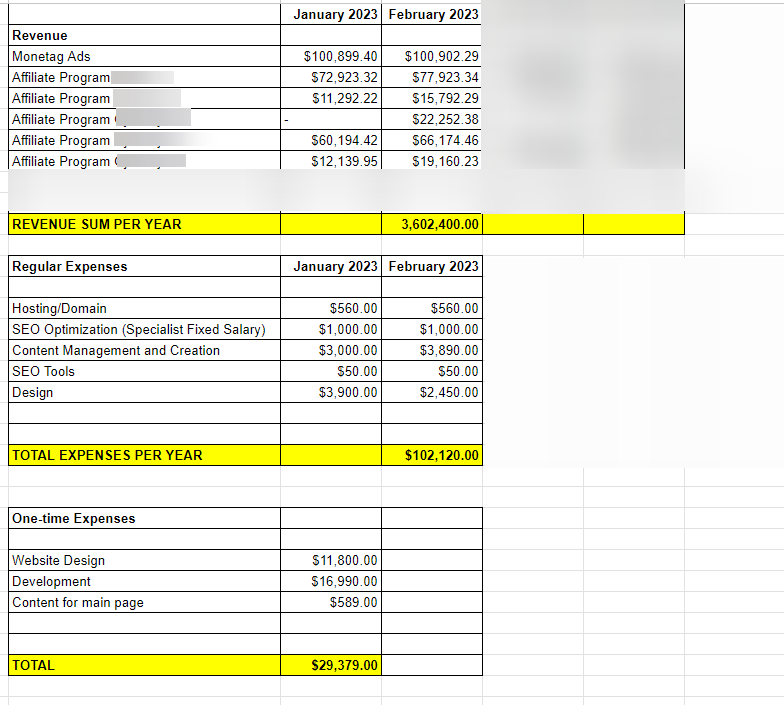
And finally, the formula: Income — Regular Expenses + Expenses = Net Profit for 12 months.
Then our golden rule again: the website price is 2-3 times its annual net profit. So, multiply this net profit from your file by 2 or 3. In our case, the net profit is $3,529,659, so the website’s price might reach a whopping $10,588,977.
Tip from Monetag: When you want to sell a website and can’t decide what final price to set, you can request an estimation from marketplaces like Flippa. You will already have the website worth calculated, but a third-party valuator will help you to fit in the market by comparing it with other similar offers.
Where Can I Buy or Sell a Website: Best Platforms Overview
The best way here is to look at website marketplaces. They work just like second-hand marketplaces (yes, eBay or similar) — but people sell their sites instead of old vinyl.
A couple of reasons why this idea is good:
- Such platforms have many offers, and if you want to sell a site, you will also come across plenty of visitors
- Marketplaces control all deals using Escrow.com — a third-party company that verifies funds and protects both buyer and seller.
Of course, publishers don’t just share a link to your site and wait. So, make sure there are several reports that prove how much a website’s worth:
- Ad Spend – if a publisher uses paid ads
- Google Analytics reports with metrics of visits, clicks, etc.
- Google Search Console Report that will prove the potential value of traffic
- Revenue reports
If you are a seller, prepare these reports from your side.
Now, you are ready to go to one of the marketplaces — to buy or to sell your website. There are plenty of them, and we collected the top popular ones with the best ratings. We added listing fees and sales commissions for sellers — but if you are a buyer, you won’t pay anything extra.
| Marketplace | Listing Fee | Succesful Sales Commission |
| Flippa | $49 | 5%-10% |
| Empire Flippers | free | 15% up to $700K |
| FE International | free | 15% up to $500K |
To Sum Up
We wish you to find a real bargain, after all! And, don’t forget you can give your existing or new site it a fresh breath with Monetag formats — some of them don’t even require any effort from your side.
Or probably you have another great traffic source — like social networks? Anyway, you are welcome —
